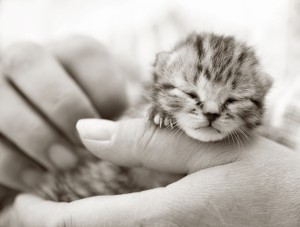 “Fostering a cat is not a lifetime commitment, it is a commitment to saving a life.”
“Fostering a cat is not a lifetime commitment, it is a commitment to saving a life.”
This is the watchword of cat rescues everywhere.
To foster a cat is, quite simply, to save that cat’s life. A foster home provides this same cat with a safe, temporary place of refuge until he/she is ultimately placed in a permanent, adoptive home.
Most rescues rely solely on a network of dedicated, volunteer foster homes, and could not survive without them. And rescues NEVER have enough foster homes.
Why? Because there are more cats in need than there are foster homes available to meet that need.
There are many benefits to fostering, many pleasant surprises and many unexpected rewards. Foster parents, past and present, describe it as one of the most memorable and gratifying experiences of their lives.
Fostering is both a way of enriching the lives of the cats and people involved, and a constructive way for people to give back to their communities. Fostered cats can provide endless hours of entertainment and love for their humans, and provide invaluable life lessons for adults and children alike.
By taking a deserving cat into their home, fosters increase that cat’s chances of being adopted. Foster families have the time and the ability to transform their foster cat — through one-on-one contact, exercise, feeding and training — into a happy and well mannered companion pet any person or family would be proud to call their own.
Fostering provides a needy cat with a stable environment, coupled with love, attention and affection. While the foster family provides the food, the rescue usually provides everything else, including payment of all medical costs to ensure the cat’s ongoing health and wellbeing.
Fosters are the essential eyes and ears of rescue. By spending every day with their foster cat, fosters will learn all they can about his/her particular personality. They will be able to identify any behavioral issues that need to be addressed, then work on addressing them.
If fosters already have a cat – either their own or another foster — in residence, all the better. The more animals their foster cat meets, the more socialized he/she will become, the more easily he/she will handle stress, and the more relaxed he/she will be around strangers.
For those who have never owned a cat, fostering provides them with the unique opportunity of seeing whether they themselves are suited for permanent “pet parenthood.”
But fostering a cat is NOT a form of trial adoption for that particular cat. There is even a term for it: foster failure. The most successful fosters are those who, despite being emotionally invested, know that they are essentially a stepping stone towards their foster cat’s future. And that as one successfully fostered cat leaves their home, another needy and deserving cat is waiting to enter it.
Ultimately, then, fostering a cat saves not just one life, but two.
Article written by Nomi Berger. Nomi is the best selling author of seven novels, one work of non-fiction, two volumes of poetry and hundreds of articles. She lives in Toronto, Ontario, Canada with her adopted Maltese, Mini, and now devotes all of her time volunteering her writing skills to animal rescue organizations throughout Canada and the USA.









Comments